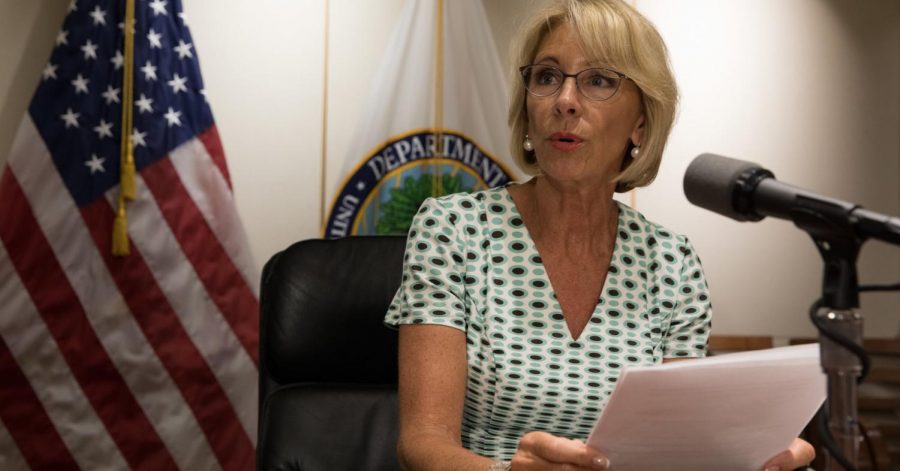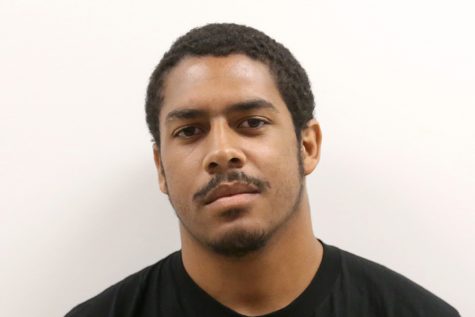Title IX changes would add methods to investigate
U.S. Secretary of Education Betsy DeVos has proposed changes to current Title IX policy after a wave of accusations have come forth challenging the reputations of many popular and well-known people, such as Supreme Court Justice Brett Kavanaugh.
Dec 5, 2018
The public comment period is underway for Secretary of Education Betsy DeVos’ proposed changes to how sexual abuse is handled on college campuses.
Starting Thursday, the public comment period gives 60 days for citizens to send their thoughts on the proposal to become a part of the public record.
The proposed regulations would revamp the way college investigations would be handled and provide clear guidelines for how colleges should examine sexual harassment.
Title IX protects people from discrimination based on sex in education programs or activities that receive federal financial assistance.
The proposal comes in the wake of the Brett Kavanaugh hearings and during an increased focus on campus sexual assault investigations.
The proposal is intended to provide expanded fairness in investigations for victims and for the accused.
According to The Campus Sexual Assault (CSA) Study for the National Institute of Justice, one in five women and one in 16 men are sexually assaulted while in college.
The proposal provides definitions for sexual harassment, so it falls under the civil rights issues Title IX addresses.
According to the proposal, sexual assault is defined by three parameters.
A school employee conditioning an educational benefit or service upon a person’s participation in unwelcome sexual conduct.
Unwelcome sexual conduct that is “so severe, pervasive and objectively offensive that it effectively denies a person equal access to the school’s education program or activity.”
Also, sexual assault is defined as an offense that meets the definition of rape, sodomy, sexual assault with an object, fondling, incest, or statutory rape as used in the FBI’s Uniform Crime Report (UCR) program, according to Clery Act regulations.
According to the proposed bill, a live hearing is required during the investigation of an assault where victims and the accused could cross-examine each other through an adviser or lawyer.
An impartial third party will preside over the hearing under the presumption of innocence — similar to a courtroom.
The proposal was immediately met with resistance from sexual assault victim advocacy groups and Congress.
On Friday, during a press conference alongside several advocacy groups, Senator Patty Murray (Washington) and Senator Maggie Hassan (New Hampshire) urged the public to share their displeasure during the public comment period.
“The Education Department is required to consider all comments from the public before making a final decision on these regulations,” Hassan said.
The senators called into question the proposal’s lack of protections for victims and its easier pathway for colleges to avoid responsibility.
“Her proposed rule will return us to a time when sexual assault survivors were ignored and felt they had nowhere to turn,” Murray said.
Opponents of the proposal fear the bill will only further drive victims into the shadows.
According to “The Sexual Victimization of College Women,” a report from the US Department of Justice, more than 90 percent of sexual assault victims on college campuses do not report the assault.




Rebecca Kane • Dec 11, 2018 at 8:19 am
Okay – So it is mentioned that 20% of women – 1 in 5 – and .06% of men – 1 in 16 – are sexually assaulted while in college – Why is there no mention herein – or in Betsy’s Rules anywhere – what percentage of each gender is doing all this sexual assaulting and harassing? Since we are discussing Title IX, the mandate is “to protect people of both sexes against discrimination regarding sexual harassment and assault” – specifying statistics about the genders of victims is only half the facts – in my mind is is discriminatory from the get-go if statistical data about the gender of sexual assaulters and harassers is not likewise included – Betsy’s best superpower is shifting Public Education Funding to Corporate Profit Centers – and altogether, in my opinion, this new set of Rules seems built to protect the funding streams/reputations of Universities and Colleges more than to protect the rights of sexual assault and harassment victim/survivors.